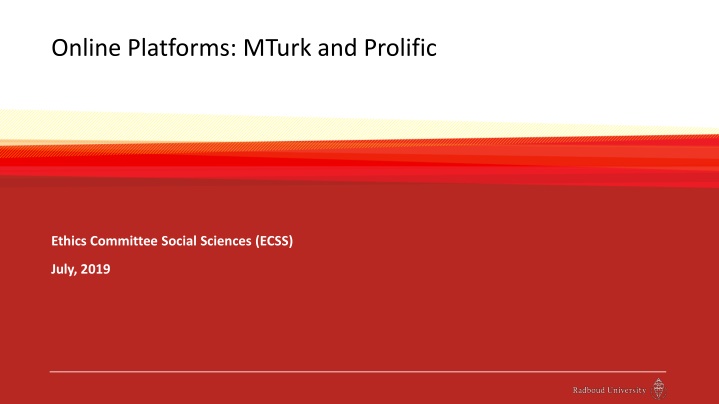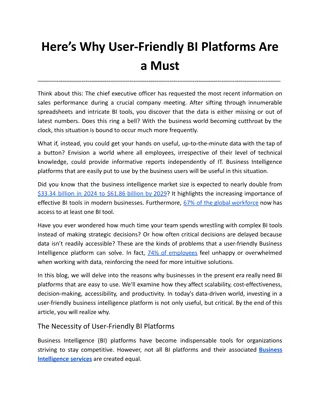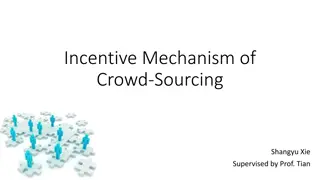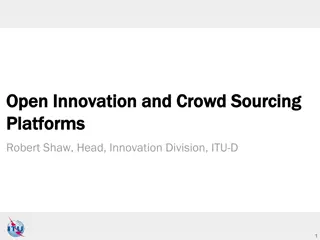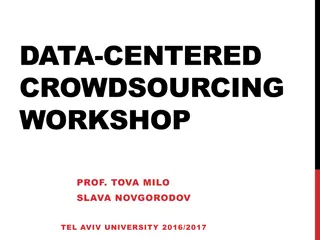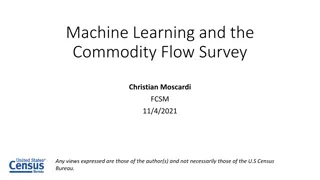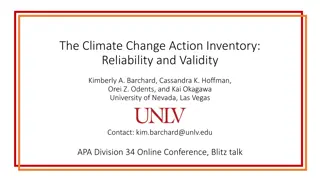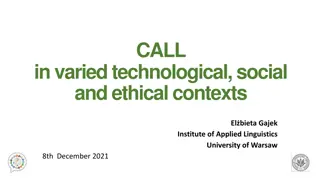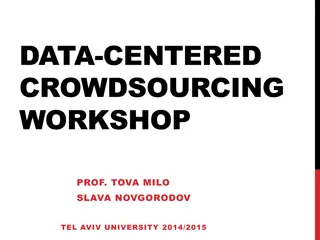Online Platforms for Crowdsourcing Behavioral Research: MTurk and Prolific
Online platforms like MTurk and Prolific offer benefits such as faster data collection, larger samples, cost reductions, and diverse participant pools for behavioral research. However, considerations need to be made regarding recruitment, data collection, scientific validity, and ethical guidelines when using these platforms. Understanding the characteristics of participants on MTurk is crucial to assess their suitability for specific research purposes.
Download Presentation

Please find below an Image/Link to download the presentation.
The content on the website is provided AS IS for your information and personal use only. It may not be sold, licensed, or shared on other websites without obtaining consent from the author.If you encounter any issues during the download, it is possible that the publisher has removed the file from their server.
You are allowed to download the files provided on this website for personal or commercial use, subject to the condition that they are used lawfully. All files are the property of their respective owners.
The content on the website is provided AS IS for your information and personal use only. It may not be sold, licensed, or shared on other websites without obtaining consent from the author.
E N D
Presentation Transcript
Online Platforms: MTurk and Prolific Ethics Committee Social Sciences (ECSS) July, 2019
Content Online platforms for crowdsourcing behavioural research - Benefits - Recruitment vs data collection MTurk - Scientific considerations - Ethical considerations Prolific - Scientific considerations - Ethical considerations References and further reading
Online platforms for crowdsourcing behavioural research Benefits - Faster data collection & larger samples - Reductions in costs - More diverse populations than sample of university students - Viable option to replicate findings with a different sample quickly
Online platforms for crowdsourcing behavioural research Recruitment vs data collection - Some platforms only provide recruitment services (and you can post a link to your study; e.g., via Qualtrics) - Other platforms also provide services for data collection (e.g., software, create & host experiments) - And there are platforms that provide both Clearly indicate which platform you are using and for what purpose
MTurk Amazon Mechanical Turk (MTurk) Founded in 2005 Platform for crowdsourcing participants ( workers / turkers ) According to Amazon, there are more than 500,000 registered workers from 190 countries* Researchers and businesses ( requestors ) can pay a fee to MTurk workers to complete Human Intelligence Tasks (HITs) HITs may include surveys, experiments, coding tasks, or any other work requiring human intelligence HITs can be posted using the internal MTurk survey platform (e.g., through TurkPrime) or by posting a link to an external survey platform (e.g., Qualtrics). After the HITs are completed, the requestor must either accept or reject the work. Once the work is accepted, the worker is compensated through their Amazon account.
MTurk Scientific considerations Sample characteristics - sample tends to be anchored primarily in the US (~90%) or India (~7%) -> not representative of US and/or general population - MTurk workers are less emotionally stable, have higher negative affect, lower levels of well- being, and lower social engagement (compared to a community and/or student sample) - MTurk workers are more educated, less religious, and more likely to be unemployed (compared to the general population) - MTurk samples are less likely to complete a survey, have higher dropout rates, and are prone to social desirability bias, dishonesty and inattention (incentivized to complete HITs quickly to maximize return on investment) Understand the characteristics of the general MTurk participant pool and assess whether Mturk demographic characteristics are appropriate for the specific study goals at hand*
MTurk Scientific considerations Procedures that may affect the quality of the data* - there is a possibility that more than one individual uses the same Amazon account to complete HITs on MTurk - estimated that 80% of the HITs are being completed by 20% of the most active workers (so called Super Turkers )**. Related problems: * growing participant non-naivety * familiar with common experimental paradigms and adept at avoiding attention checks * Super Turkers repeat participation in similar research (previous exposure effects to same research design & reading instructions less carefully) -> problem is exacerbated by the existence of several discussion boards that MTurk workers regularly use to discuss, and share information about, tasks - large portion of non-English speakers may affect results - some research found bot-like responses (using VPN to hide their location)
MTurk Scientific considerations Procedures that may affect the quality of the data CONTINUED - using the selection criteria high HIT approval rating and/or large number of HITs completed may increase the representation of Super Turkers in a sample - researchers can accept or reject work (because participants e.g., failed attention checks or quality of data is low) * participants may try to anticipate the results they believe requestors expect, to maximize chance of yielding such results and not get rejected
MTurk Scientific considerations Low payment - may lead to unreliable / not serious answers - may impact quality of the data on MTurk* On the other hand, increasing payment - may attract Super Turkers or Mturkers who view MTurk as a substantial source of income - for further discussion, see the ethical considerations on the next slides
MTurk Ethical considerations Insufficiently clear whether participant s interests are respected in line with our national Code of Ethics We will explain the following points in more detail: * Possible exploitation of participants / low payment * Unclear whether participants are adequately protected in the event of deception * No say on work regulations (digital sweatshop) * Dependency of academic research (digital giant)
MTurk Ethical considerations * Possible exploitation of participants / low payment - Average hourly pay, on average $1.50 (median ~ $2, only 4% earns more than $7.25/hour) A survey typically takes a couple of minutes per person, so the hourly rate is very low Especially problematic given that the majority of MTurk tasks are completed by a small set of workers who spend long hours on the website, with many of them being very poor, unemployed (underemployed), often elderly or disabled -> for 25% of workers on online platforms sub-minimum wage online tasks are the only work available - 2/3 of MTurkers consider themselves as somewhat exploited
MTurk Ethical considerations * Possible exploitation of participants / low payment - CONTINUED - Increasing payment is not necessarily preferred it may coerce someone to participate or continue in a study that they do not want to do*** tasks that pay the best and take the least time get snapped up quickly by workers, so workers have to monitor the site closely, waiting to grab them. Workers are not paid for this waiting time. deciding on ethical pay is difficult -> minimum wage of US where Amazon is based, or minimum wage where the individual lives? Not everyone can complete the same amount of HITs in one hour. *** Relatedly, many requestors post tasks that take longer than they say to complete As workers already invested time, they will still complete the task resulting in lower hourly pay
MTurk Ethical considerations * Unclear whether participants are adequately protected in the event of deception - Explanation and care unclear after deception and manipulation - Researchers are able to post requests in a non-transparent way
MTurk Ethical considerations * No say on work regulations (digital sweatshop) - Amazon puts little effort into policing MTurk or establishing pay standards In Amazon s own guidelines for researchers, $6/hour is suggested but not required Researchers can even list payments as low as $0.01 - Amazon is fairly uninvolved in ensuring that the environment for workers and requestors is a positive one Possible exploitation because workers can not rate researchers - Amazon s own terms of service describe their involvement only as a payment processor - Amazon strives to keep costs down and profits up
MTurk Ethical considerations * No say on work regulations (digital sweatshop) - CONTINUED - researchers can accept or reject work (because participants e.g., failed attention checks or quality of data is low) -> Amazon will not intervene when workers believe their work was rejected unfairly - there seems to be a general trust issue towards requestors -> workers try to participate in studies of researchers they already know
MTurk Ethical considerations * Dependency of academic research (digital giant) - Amazon generates income as a percentage of each HIT payment: 20% fee on what researchers pay to workers [January 2018] -> has caused requestors to offer less money to workers - Speaking negatively about Amazon has led to account suspensions; account can get terminated without notice
Prolific Prolific Academic Launched in 2014, by graduate students from Oxford and Sheffield Universities Platform for subject recruitment 60.000 accounts (in January 2017); 35.600 active accounts (in December 2017) Researchers can integrate any survey or experimental software by using a link. Longitudinal studies can also be implemented. It is not possible to create a survey using Prolific -> Prolific is only for recruitment Free prescreening based on previous approval rate demographics taking part in previous studies questions used in earlier studies propose your own question to Prolific
Prolific Scientific considerations Sample characteristics - access to new, more na ve populations than MTurk degree of overlap between platforms seem to be quite small (22% of Prolific users also use MTurk) - similar distribution in ethnicity as MTurk although a lower % of non-Caucasian participants and more participants outside the US ~25% North America, ~31% UK, ~27% Europe, ~8% South America, ~6% India, rest from Africa and East Asia more diverse participants - less dishonest participants than MTurk
Prolific Scientific considerations Quality of the data - data quality comparable to MTurk (1 study) - dropout rate similar to MTurk (1 study -> 10%) - lower cheating degree than on MTurk - completed tasks per (active) worker less skewed more na ve * 69% of Prolific users spend between 1 and 8 hours per week (majority 1-2 hours per week) -> Mturk: 79% of MTurk users spend 8 or more hours per week on the platform * Median number of tasks completed per participant Prolific 10-30 MTurk 5900-7100 - Prolific is actively banning bots
Prolific Ethical considerations Payment - minimum reward / fixed pay per unit of time ( 6.50/hour) - time required for an experiment is initially estimated by the experimenter, but is then updated with the actual time taken once participants make submissions
Prolific Ethical considerations Protection of participants - Participants can be messaged without compromising anonymity - Prolific has detailed rules regarding the treatment of subjects on the platform - Participants are explicitly informed that they are recruited for participation in research - Clear guidelines for researchers for the handling of submissions - Clarity about rights, obligations and compensation - Rejections of submissions have to be reasonable and can be overruled if a participant objects to a rejection - Subjects have several options for terminating a study without negatively affecting their reputation score -> quick and risk-free option for withdrawing consent at any time during the study
Prolific Ethical considerations Prolific as a research platform - User-friendly interface - Services explicitly targeted at researchers (and startups) - Supported by the University of Oxford - Providing a subject pool for research is the core of Prolific s business MTurk is not a focus-product of Amazon and has not seen much development in recent years - GDPR compliant and approved by FSW privacy-officer as a recruitment platform
References and further reading https://www.brookings.edu/blog/brown-center-chalkboard/2016/02/08/can-crowdsourcing-be-ethical/ https://www.theatlantic.com/business/archive/2018/01/amazon-mechanical-turk/551192/ https://www.psychologicalscience.org/observer/using-amazons-mechanical-turk-benefits-drawbacks-and- suggestions Hara, K., Adams, A., Milland, K., Savage, S., Callison-Burch, C., & Bigham, J. P. (2018, April). A data-driven analysis of workers' earnings on amazon mechanical turk. In Proceedings of the 2018 CHI Conference on Human Factors in Computing Systems (p. 449). ACM. Keith, M. G., Tay, L., & Harms, P. D. (2017). Systems perspective of Amazon Mechanical Turk for organizational research: Review and recommendations. Frontiers in psychology, 8, 1359. McCredie, M. N., & Morey, L. C. (2018). Who are the Turkers? A characterization of MTurk workers using the Personality Assessment Inventory. Assessment, 1073191118760709. Milland, K. (2016). A Mechanical Turk worker s perspective. Journal of Media Ethics, 31(4), 263-264. Pittman, M., & Sheehan, K. (2016). Amazon s Mechanical Turk a digital sweatshop? Transparency and accountability in crowdsourced online research. Journal of media ethics, 31(4), 260-262.
References and further reading https://blog.prolific.ac/so-you-want-to-recruit-participants-online/ https://helpcentre.prolific.ac/hc/en-gb/articles/360009223133-Is-online-crowdsourcing-a-legitimate- alternative-to-lab-based-research- Palan, S., & Schitter, C. (2018). Prolific. ac A subject pool for online experiments. Journal of Behavioral and Experimental Finance, 17, 22-27. Peer, E., Brandimarte, L., Samat, S., & Acquisti, A. (2017). Beyond the Turk: Alternative platforms for crowdsourcing behavioral research. Journal of Experimental Social Psychology, 70, 153-163.
